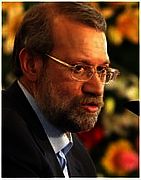Majlis To Enter Nuclear Case
» Ali Larijani: Will Speed Up Enrichment
Following the passage of the latest round of United Nations Security Council sanctions resolution and the subsequent unilateral sanctions resolutions by the United States and the European Union against Iran, and while yesterday representatives of the 5+1 Group announced that the path to negotiations is open, Ali Larijani and several Majlis lawmakers, rather than administration officials, took over the nuclear case, speaking about reciprocating the sanctions and calling for a new condition to resume negotiations.
Speaking to the Mehr news agency, Ali Larijani criticized the 5+1 Group (composed of the United States, Russia, France, China, Britain and Germany): “Westerners and Americans are following a treacherous path. On one side, they use force through the Security Council to unjustly throw stones on Iran’s path. On the other side, they boast that we are still ready to talk.”
Larijani, who sits on the National Security Council, said, “In my opinion, they are not interested in genuine talks. They want for talks to fail so that they can use that as leverage later. That’s their strategy.”
Noting that “Iran has always favored talks, but talks require a new framework,” the eighth Majlis speaker said, “Currently, the most important thing apart from the issue of talks is to speed up the development of nuclear technology. Westerners must know that whenever they want to throw stones on Iran’s path, Iran takes two or three steps forward. If they want to hold talks with Iran, the talks must be comprehensive.”
Ali Larijani, who has taken a more active role in Iran’s foreign policy since the passage of the United Nations’ latest sanctions resolution (1929) against Iran, revealed details about a new eighth Majlis’ bill to neutralize the sanctions resolution: “The bill has been prepared based on the strategy that, if the opposing side speaks to Iran with disrespect, Iran would take new steps. In the bill, we bind the administration to continue enrichment at the 20 percent level. If westerners want to use the Security Council unfairly, we will move forwarding according to the Majlis plan. That would send an important message to them, that we are continuing to develop our nuclear program both qualitatively and quantitatively.”
Noting that the “bill states that the government must impose certain limitations on some inspectors and their activities,” Larijani added, “The International Atomic and Energy Agency is not supposed to be a nest for spies who want to take over Iran’s nuclear case and use it for their own political benefit.”
Commenting on the West’s latest decision to inspect Iranian ships, Ali Larijani said, “In this respect also, an important decision was made to reciprocate the measure. If some countries decide to use hard tools against Iranian ships, which carry conventional goods, they must know that Iran would reciprocate the act.”


